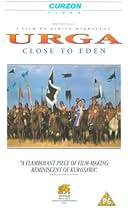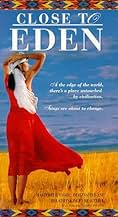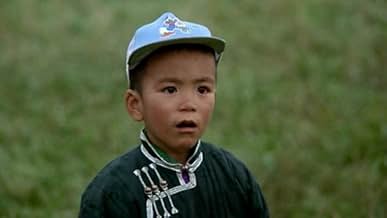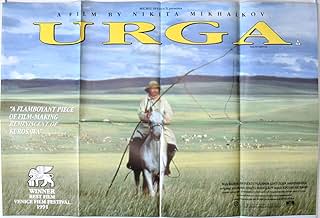AVALIAÇÃO DA IMDb
7,5/10
4 mil
SUA AVALIAÇÃO
O fazendeiro Gombo (Bayaertu) mora com sua mulher, filhos e avó em uma humilde tenda, na Mongólia. Eles têm suas vidas mudadas quando Serguei (Vladimir Gostyukhin), um motorista de caminhão ... Ler tudoO fazendeiro Gombo (Bayaertu) mora com sua mulher, filhos e avó em uma humilde tenda, na Mongólia. Eles têm suas vidas mudadas quando Serguei (Vladimir Gostyukhin), um motorista de caminhão russo, fica preso com seu veículo nas redondezas.O fazendeiro Gombo (Bayaertu) mora com sua mulher, filhos e avó em uma humilde tenda, na Mongólia. Eles têm suas vidas mudadas quando Serguei (Vladimir Gostyukhin), um motorista de caminhão russo, fica preso com seu veículo nas redondezas.
- Direção
- Roteiristas
- Artistas
- Indicado a 1 Oscar
- 5 vitórias e 12 indicações no total
Nikolay Vashchilin
- Nikolai
- (as Nikolai Vachtchiline)
Larisa Kuznetsova
- Marina
- (as Larisa Kuwnetsova)
Nikita Mikhalkov
- Bicycle rider
- (não creditado)
Avaliações em destaque
If you ever wondered how an ordinary life could have been like without constant bombardment of television, ads and all the trappings of a hierarchical society, this movie beautifully depicts the life such a family, in the process of being unconsciously absorbed by the modernity the rest of us are so familiar with. The lead guy's performance as he tries to bemusedly make sense of the city and its services and warez is very touching. Its sad to see a strong, capable, independent soul finely tuned to the nature he is part of being slowly displaced by the "greater" civilisation, but its also an uplifting narrative of escapisim to a place where the contradictions and pretensions of the organised society does not exist.
One of the best films I know: beautiful, pensive, playful, realistic, poetic, humane, up-lifting. In the barrage of trash, one of the few films that makes me believe in humanity. I love this film so much that I arranged home projections for my friends several times. With all the up beat that I am mentioning, it is very open and truthful. Where in an American movie could you see an on-screen slaughter of a real lamb? And it was not ugly or gory at all! On the contrary, it was very decent and sensitive, teaching us respect for Nature.
And another little point. Has anybody noticed the inconspicuous little voice-over at the end which essentially makes "Urga" science fiction?!
And another little point. Has anybody noticed the inconspicuous little voice-over at the end which essentially makes "Urga" science fiction?!
10johan-16
This movie shows us a world without any borders, laws. Just a bunch of people who live in a superb nature, which fills the wide moviescreen in its endless beauty. It reminds us, how far we are away from nature, from our roots of our ancesters. That's why I think this movie appeals the people from all over the world. And especially those who like the widescreen movies from John Huston to Visconti. Only for the superb shots you can see it over and over again. It's, without any doubt a timeless beaty
The best definition I can give to movies I greatly admire is that they take me someplace I don't expect to go.
It can be a special location. It can be a special moment. It can be a special revelation.
Close to Eden, as this movie has been titled in the United States, offers the entire combination. A 1992 Russian nominee for the Oscar for Best Foreign Language Film, the movie opens on the vast grassy expanses of the steppes of Mongolia, where the setting initially is evocative of a certain timelessness. The historical instant cannot be ascertained confidently, even within an error margin of a few centuries. Nor do we know what the movie designs ultimately to tell us.
Such uncertainty begins to give way as a vehicle and visitor enter the scene and are involved in a mishap that results from first sleepiness and then fright. The nature of the vehicle and visitor narrow the reference era to an accuracy level of mere decades. From there, the plot leads to a likable nuclear family of herders, to which a grandmother is attached. We follow their story and soon learn when, among the vast expanses of time, it occurs.
The theme here is subtly...ecological...in three parts. The first part concerns the lifestyle of the family, and its self-sufficiency. The second part concerns the travel the father undertakes, and the reason for the travel, an assigned errand he seeks to accomplish in the course of that journey. The third part concerns the conclusion, where the issue of time again intervenes. There is in fact no timelessness, but rather its passage. The narrator in A River Runs Through It is "haunted by waters." Similarly, the ending of Close to Eden is haunted by grasses. Its status as one of the great foreign films arrives in the last few knockout minutes.
It can be a special location. It can be a special moment. It can be a special revelation.
Close to Eden, as this movie has been titled in the United States, offers the entire combination. A 1992 Russian nominee for the Oscar for Best Foreign Language Film, the movie opens on the vast grassy expanses of the steppes of Mongolia, where the setting initially is evocative of a certain timelessness. The historical instant cannot be ascertained confidently, even within an error margin of a few centuries. Nor do we know what the movie designs ultimately to tell us.
Such uncertainty begins to give way as a vehicle and visitor enter the scene and are involved in a mishap that results from first sleepiness and then fright. The nature of the vehicle and visitor narrow the reference era to an accuracy level of mere decades. From there, the plot leads to a likable nuclear family of herders, to which a grandmother is attached. We follow their story and soon learn when, among the vast expanses of time, it occurs.
The theme here is subtly...ecological...in three parts. The first part concerns the lifestyle of the family, and its self-sufficiency. The second part concerns the travel the father undertakes, and the reason for the travel, an assigned errand he seeks to accomplish in the course of that journey. The third part concerns the conclusion, where the issue of time again intervenes. There is in fact no timelessness, but rather its passage. The narrator in A River Runs Through It is "haunted by waters." Similarly, the ending of Close to Eden is haunted by grasses. Its status as one of the great foreign films arrives in the last few knockout minutes.
10Fafouin
I had to embrace my aunt after seeing this movie for having brought me to see it. The images are beautiful and the relationships are, at times, complex but always touching. Never have I experienced a filmmaker able to capture the beautiful humanity of each of his characters and their gestures. This film is a treasure and quite possibly my favorite film of all time.
Você sabia?
- CuriosidadesThis was the first film nominated for an Academy Award for Best Foreign Language Film from Russia. Previous nominees from that country had been submitted from The Soviet Union. It lost to France's Indochina (1992).
Principais escolhas
Faça login para avaliar e ver a lista de recomendações personalizadas
- How long is Close to Eden?Fornecido pela Alexa
Detalhes
- Data de lançamento
- Países de origem
- Idiomas
- Também conhecido como
- Close to Eden
- Locações de filme
- Empresas de produção
- Consulte mais créditos da empresa na IMDbPro
Bilheteria
- Faturamento bruto nos EUA e Canadá
- US$ 377.832
- Faturamento bruto mundial
- US$ 377.832
- Tempo de duração
- 1 h 59 min(119 min)
- Cor
- Proporção
- 1.85 : 1
Contribua para esta página
Sugerir uma alteração ou adicionar conteúdo ausente












